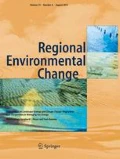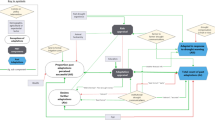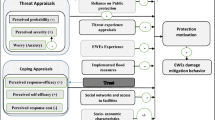Abstract
Climate change projections show that periods of droughts are likely to increase, causing decreasing water availability, salinization, and consequently farm income loss in the south-west Netherlands. Adaptation is the key to decrease a farmer’s drought vulnerability and to secure the agricultural sector’s performance at the aggregate level. Possible adaptation strategies include responses at the field scale, farm-level measures and joint adaptation measures. Using the results of a recent survey, we explore farmers’ adaptive behaviour to drought. We give detailed insight into the influence of risk appraisal and coping appraisal factors on the current level of farmers’ adaptation motivation and the adoption of three types of adaptive responses. Our findings show that behavioural factors make a significant contribution to explain the actual level of farmers’ adaptation motivation. Furthermore, we find that components of threat and coping appraisal influence adoption decisions differently across three types of drought adaptation measures.

Similar content being viewed by others
References
Adger WN, Nigel A, Tompkins E (2005) Successful adaptation to climate change across scales. Glob Environ Change 15:77–86. doi:10.1016/j.gloenvcha.2004.12.005
Adger WN, Dessai S, Goulden M, Hulme M, Lorenzoni I, Nelson DR, Naess LO, Wolf J, Wreford A (2009) Are there social limits to adaptation to climate change? Clim Change 93:335–354. doi:10.1007/s10574-008-9520-z
Ajzen I (1985) From intentions to actions: a theory of planned behaviour. In: Kuhle J, Beckmann J (eds) Action-control: from cognition to behaviour. Springer, Heidelberg, pp 11–39
Bandura A (2001) Social cognitive theory: an agentic perspective. Annu Rev Psychol 52:1–26
Beedell J, Rehman T (1999) Using social psychology models to understand farmers’ conservation behaviour. J Rural Stud 16:117–127. doi:10.1016/S0743-0167(99)00043-1
Benli B, Kodal S (2003) A non-linear model for farm optimization with adequate and limited water supplies: application to the South-east Anatolian Project (GAP) region. Agric Water Manag 62:187–203. doi:10.1016/S0378-3774(03)00095-7
Below TB, Mutabazib KD, Kirschkea D, Frankea C, Sieberc S, Siebertc R, Tscherningc K (2012) Can farmers’ adaptation to climate change be explained by socio-economic household-level variables? Global Environ Change 22:223–235
Block LG, Keller PA (1998) Beyond protection motivation: an integrative theory of health appeals. J Appl Soc Psychol 28:1584–1608. doi:10.1111/j.1559-1816.1998.tb01691.x
Botzen WJW, Aerts JCJH, van den Bergh JCJM (2009) Dependence of flood risk perceptions on socioeconomic and objective risk factors. Water Resour Res 45, doi:10.1029/2009WR007743
Bubeck P, Botzen WJW, Aerts JCJH (2012) A review of risk perceptions and other factors that influence flood mitigation behavior. Risk Anal 32:1481–1495. doi:10.1111/j.1539-6924.2011.01783.x
Bubeck P, Botzen WJW, Kreibich H, Aerts JCJH (2013) Detailed insights into the influence of flood-coping appraisals on mitigation behaviour. Glob Environ Change 23:1327–1338. doi:10.1016/j.gloenvcha.2013.05.009
Connor JD, Schwabe K, King D, Knapp K (2012) Irrigated agriculture and climate change: the influence of water supply variability and salinity on adaptation. Ecol Econ 77:149–157. doi:10.1016/j.ecolecon.2012.02.021
Cortignani R, Severini S (2009) Modeling farm-level adoption of deficit irrigation using positive mathematical programming. Agric Water Manag 96:1785–1791. doi:10.1016/j.agwat.2009.07.016
Deressa TT, Hasson RM, Ringler C, Alemu T, Yesuf M (2009) Determinants of farmers’ choice of adaptation methods to climate change in the Nile Basin of Ethiopia. Glob Environ Change 19:248–255. doi:10.1016/j.gloenvcha.2009.01.002
Deressa TT, Hassan RM, Ringler C (2011) Perception and adaptation to climate change by farmers in the Nile basin of Ethiopia. J Agric Sci 149:23–31. doi:10.1017/S0021859610000687
Deltares (2012) Zoetwatervoorziening in Nederland: aangescherpte landelijke knelpuntenanalyse 21e eeuw. Deltares report no 1205970–000-VEB-0013
Fishbein M, Ajzen I (1975) Belief, attitude, intention and behaviour: an introduction to theory and research. Addison-Wesley, Reading
Frankhauser S, Smith JB, Tol RSJ (1999) Weathering climate change: some simple rules to guide adaptation decisions. Ecol Econ 30:67–78. doi:10.1016/S0921-8009(98)00117-7
García-Vila M, Fereres E (2012) Combining the simulation crop model AquaCrop with an economic model for the optimization of irrigation management at farm level. Eur J Agron 36:21–31. doi:10.1016/j.eja.2011.08.003
Gbetibouo GA (2009) Understanding farmers’ perception and adaptations to climate change and variability. IFPRI discussion paper 00849, International Food Policy Research Institute
Gebrehiwot T, van der Veen A (2013) Farm level adaptation to climate change: the case of farmer’s in the Ethiopian Highlands. Environ Manage 52:29–44. doi:10.1007/s00267-013-0039-3
Graveline N, Majone B, van Duinen R, Ansink E (2014) Hydro-economic modeling of water scarcity under global change: an application to the Gállego river basin (Spain). Reg Environ Change 14:119–132. doi:10.1007/s10113-013-0472-0
Grothmann T, Patt A (2005) Adaptive capacity and human cognition: the process of individual adaptation to climate change. Glob Environ Change 15:199–213. doi:10.1016/j.gloenvcha.2005.01.002
Grothmann T, Reusswig F (2006) People at risk of flooding: why some residents take precautionary action while others do not. Nat Hazards 38:101–120. doi:10.1007/s11069-005-8604-6
Jara-Rojas R, Bravo-Ureta BE, Díaz J (2012) Adoption of water conservation practices: a socioeconomic analysis of small-scale farmers in Central Chile. Agric Syst 10:54–62. doi:10.1016/j.agsy.2012.03.008
Klijn F, ter Maat J, van Velzen E (2011) Zoetwatervoorziening in Nederland: Landelijke analyse knelpunten in de 21e eeuw. Deltares rapport, Delft
Klijn F, ter Maat J, van Velzen E, Hunink J (2012) Zoetwatervoorziening in Nederland: aangescherpte landelijke knelpuntenanalyse 21e eeuw. Delatres rapport, Delft
Knowler D, Bradshaw B (2007) Farmers’ adoption of conservation agriculture: a review and synthesis of recent research. Food Policy 32:25–48. doi:10.1016/j.foodpol.2006.01.003
Koerth J, Jones N, Vafeidis AT, Dimitrakoloulos PG, Melliou A, Chatzidimitriou E, Koukoulas S (2013) Household adaptation and intention to adapt to coastal flooding in the Axios–Loudias–Aliakmonas National Park, Greece. Ocean Coast Manag 82:43–50. doi:10.1016/j.ocecoaman.2013.05.008
Kuruppu N, Liverman D (2011) Mental preparation for climate adaptation: the role of cognition and culture in enhancing adaptive capacity of water management in Kiribati. Glob Environ Change 21:657–669. doi:10.1016/j.gloenvcha.2010.12.002
Lynne GD, Casey FC, Hodges A, Rahmani M (1995) Conservation technology adoption decisions and the theory of planned behaviour. J Econ Psychol 16:581–598. doi:10.1016/0167-4870(95)00031-6
Maddison D (2007) The perception of and adaptation to climate change in Africa. Policy research working paper 4308, The World Bank
Maddux JE, Rogers RW (1983) Protection motivation and self-efficacy: a revised theory of fear appeals and attitude change. J Exp Soci Psychol 19: 469–479
Mandleni B, Anim FDK (2011) Climate change awareness and decision on adaptation measures by livestock farmers in South Africa. J Agric Sci 3:258–268. doi:10.5539/jas.v3n3p258
Maneta MP, Torres MO, Wallender WW, Vosti S, Howit R, Rodrigues L, Bassoi LH, Panday S (2009) A spatially distributed hydroeconomic model to assess the effects of drought on land use, farm profits, and agricultural employment. Water Resour Res 45, doi:10.1029/2008WR007534
Mankad A, Greenhill M, Tucker D, Tapsuwan S (2013) Motivational indicators of protective behaviour in response to urban water shortage threat. J Hydrol 491:100–107. doi:10.1016/j.jhydrol.2013.04.002
Marshall GR (2013) Transaction costs, collective action and adaptation in managing complex social-ecological systems. Ecol Econ 88:185–194. doi:10.1016/j.ecolecon.2012.12.030
Martin IM, Bender H, Raish C (2007a) Making the decision to mitigate risk. In: WE Martin, C Raish, Kent B, (eds) Wildfire risk: human perceptions and management implications: resources for the future. Washington, DC, p 117–141
Martin IM, Bender H, Raish C (2007b) What motivates individuals to protect themselves from risks: the case of wildland fires. Risk Anal 27:887–900. doi:10.1111/j.1539-6924.2007.00930.x
Martin WE, Martin IM, Kent BL (2009) The role of risk perceptions in the risk mitigation process: the case of wildfire in high risk communities. J Environ Manage 91:489–498. doi:10.1016/j.jenvman.2009.09.007
Mendelsohn R (2000) Efficient adaptation to climate change. Clim Change 45:583–600
Miceli R, Sotgiu I, Settanni M (2008) Disaster preparedness and perception of flood risk: a study in an Alpine valley in Italy. J Environ Psychol 28:164–173
Nicholas KA, Durham WH (2012) Farm-scale adaptation and vulnerability to environmental stresses: insights from winegrowing in Northern California. Global Environ Change 22:483–494
Poussin JK, Botzen WJ, Aerts CJH (2014) Factors of influence on flood damage mitigation behaviour by households. Environ Sci Policy 40:69–77. doi:10.1016/j.envsci.2014.01.013
Rehman T, McKemey K, Yates CM, Cooke RJ, Garforth CJ, Tranter RB, Park JR, Dorward PT (2007) Identifying and understanding factors influencing the uptake of new technologies on dairy farms in SW England using the theory of reasoned action. Agric Syst 94:281–293. doi:10.1016/j.agsy.2006.09.006
Reidsma P, Ewert F, Oude-Lansink A, Leemans R (2010) Adaptation to climate change and climate variability in European agriculture: the importance of farm level responses. Eur J Agron 32:91–102. doi:10.1016/j.eja.2009.06.003
Rogers RW (1975) A protection motivation theory of fear appeals and attitude change. J Psychol 91
Siegrist M (2013) The necessity for longitudinal studies in risk perception research. Risk Anal 22:50–51. doi:10.1111/j.1539-6924.2012.01941.x
Stern N (2006) Review on the economics of climate change. Cambridge University Press, New York
Toft HI, O’Hanlon PW (1979) A dynamic programming model for on-farm decision making in a drought. Rev of Mark Agric Econ 47:5–16
Tolk L (2012) Zoetwater verheldert: Maatregelen voor zoetwater zelfvoorzienendheid in beeld. Kennis voor Klimaat, rapportnummer KvK 90/2013
Wauters E, Bielders C, Poesen J, Govers G, Mathijs E (2010) Adoption of soil conservation practices in Belgium: an examination of the theory of planned behaviour in the agri-environmental domain. Land Use Policy 27:86–94. doi:10.1016/j.landusepol.2009.02.009
Wheeler S, Zuo A, Bjornlund H (2013) Farmers’ climate change beliefs and adaptation strategies for a water scarce future in Australia. Glob Environ Change 23:537–547. doi:10.1016/j.gloenvcha.2012.11.008
Acknowledgments
This research is part of the Dutch ‘Knowledge for Climate’ national research programme and has been co-funded by a strategic research project of Deltares. The financial support of the Netherlands Organization for Scientific Research (NWO) VENI Grant 451-11-033 is highly appreciated.
Author information
Authors and Affiliations
Corresponding author
Additional information
Editor: Elena M. Bennett.
Electronic supplementary material
Below is the link to the electronic supplementary material.
Rights and permissions
About this article
Cite this article
van Duinen, R., Filatova, T., Geurts, P. et al. Coping with drought risk: empirical analysis of farmers’ drought adaptation in the south-west Netherlands. Reg Environ Change 15, 1081–1093 (2015). https://doi.org/10.1007/s10113-014-0692-y
Received:
Accepted:
Published:
Issue Date:
DOI: https://doi.org/10.1007/s10113-014-0692-y




